theartsdesk in Aarhus: SPOT Festival 2011 | reviews, news & interviews
theartsdesk in Aarhus: SPOT Festival 2011
theartsdesk in Aarhus: SPOT Festival 2011
Denmark's annual festival comes up with the goods from knowns and unknowns
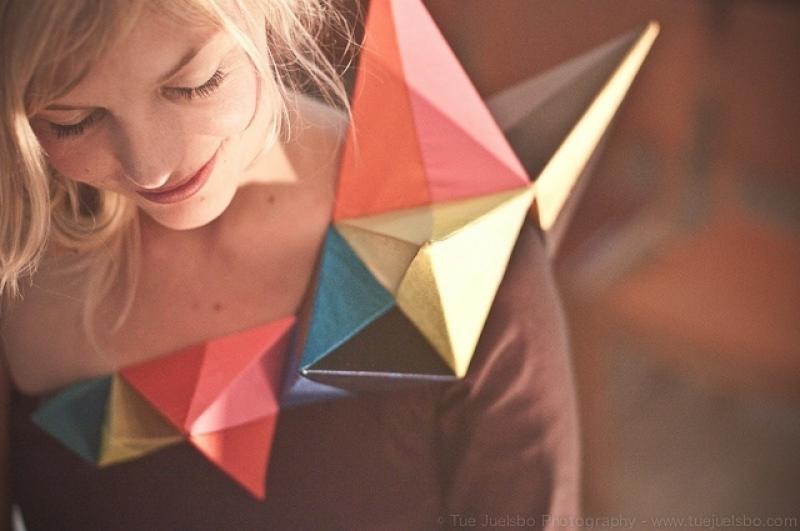
On the Jutland coast, Aarhus is Denmark’s second largest city after capital Copenhagen. Its attractive continental atmosphere is amplified by the presence of this week’s temporary population, which includes visitors from Britain, Estonia, France, Germany, Luxembourg, the US and the other Nordic countries. They’re here for SPOT, Denmark’s annual festival showcasing homegrown music. It’s a good moment as electro-popper Oh Land is making significant waves in the States.
Of course, Denmark’s been connecting with the outside world for centuries, from Viking-era incursions to trade-related branding like Danish Bacon. There’s little evidence for Viking-era Aarhus on the surface, but the remains of Ninth/10th-century pit houses are seen in the basement of a city-centre branch of the Nordea bank. Stretching back further, to the south of the city at the Moesgård Museum, the well-preserved bog body of the Iron Age Grauballe Man is on display. The city centre is dominated by the massive cathedral, the Domkirke, completed in the late 13th century and rebuilt in the 15th. The striking, Modernist city hall opened in 1941. Aarhus – Århus until the start of 2011 – isn’t short on history.
Somewhere this pleasant doesn’t need to dwell on its past. A canal cuts the city in half, and its banks are lined with spiffy bars and restaurants with pretty terraces (pictured below right). Cute hot dog stands pop up at random. There’s enough in the quarter-million population Aarhus to distract without the music, or even the history.
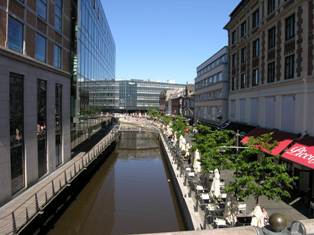 Although most SPOT attendees aren’t paying attention to the city’s history, the festival's opening show takes place in the Domkirke, the first concert the cathedral has allowed. This privileged slot was taken by Our Broken Garden, whose recent album Golden Sea was the allusive story of a journey through the wild lands that results in the fateful acceptance of death and a communion with nature. The spirituality of Our Broken Garden's music was at home here.
Although most SPOT attendees aren’t paying attention to the city’s history, the festival's opening show takes place in the Domkirke, the first concert the cathedral has allowed. This privileged slot was taken by Our Broken Garden, whose recent album Golden Sea was the allusive story of a journey through the wild lands that results in the fateful acceptance of death and a communion with nature. The spirituality of Our Broken Garden's music was at home here.
Musicians were scattered about the cathedral on platforms, with no central PA and the sound filling the space. Anna Brøndsted, whose vision Our Broken Garden is, was situated at the end of the main aisle, in front of the alter. A harp player was close to the main entrance, a viola and cello player about halfway along. A guitarist prowled an aisle. Instead of becoming a fragmented experience, everything seamlessly knitted. The audience sat reverently.
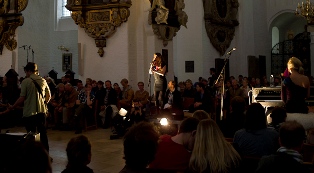 The concert featured most of Golden Sea’s tracks, but in a new sequence (pictured left, photo by Tue Juelsbo). Two instrumentals were created by Swedish composer Gustaf Ljunggren – an overture and an interlude. This never-to-be-repeated concert was overwhelmingly emotive. Afterwards, it felt as though this was it, this is as good as it gets, time to return to the UK.
The concert featured most of Golden Sea’s tracks, but in a new sequence (pictured left, photo by Tue Juelsbo). Two instrumentals were created by Swedish composer Gustaf Ljunggren – an overture and an interlude. This never-to-be-repeated concert was overwhelmingly emotive. Afterwards, it felt as though this was it, this is as good as it gets, time to return to the UK.
Reflecting on the Domkirke experience, Brøndsted explained that “music is a spiritual search. My wish in music is to get a connection between people, a deeper connection. People can recognise themselves in the music, so it can speak to the parts of us that are within all of us. Going to a church is the same kind of experience, the connections. The idea of separating the musicians just popped into my head. I realised using the room would be difficult because there is a reverberance of seven seconds. But we did not fill it with speakers until the night before. Even so, I felt very comfortable, very safe. When people come into a church a little bit of awareness of ourselves turns inwards. That makes an atmosphere which makes us feel safe”.
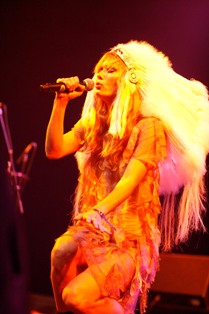 Although a core goal of SPOT is to showcase new acts, a raft of performers were familiar to audiences. Vinnie Who’s Eighties-style electro disco-pop was a big draw, as was pop singer Fallulah – so much so that I couldn’t get in to her show. Thankfully, I did get to see a magnificent show by Oh Land which underpinned why Nanna Øland Fabricius is on the brink of world-wide success (pictured right, photo by Michael Ersted). It also rammed home that SPOT doesn’t just attract a music industry crowd looking for new clients. The paying audience outnumbers biz types massively.
Although a core goal of SPOT is to showcase new acts, a raft of performers were familiar to audiences. Vinnie Who’s Eighties-style electro disco-pop was a big draw, as was pop singer Fallulah – so much so that I couldn’t get in to her show. Thankfully, I did get to see a magnificent show by Oh Land which underpinned why Nanna Øland Fabricius is on the brink of world-wide success (pictured right, photo by Michael Ersted). It also rammed home that SPOT doesn’t just attract a music industry crowd looking for new clients. The paying audience outnumbers biz types massively.
A major attraction is the setting of the festival. All the venues are close to each other. SPOT is centred on the Musikhuset which has four halls, two seated and two standing, the largest an analogue of the Festival Hall. Live sound is always great and shows run to time. Extra attractions come from off-festival events like the yard party held by the Danish music blog Regnsky (pronounced rain-sku), which hosted Saturday afternoon semi-acoustic sets by Treefight For Sunlight, the fine and Americana-ish Cody and Sleep Party People (who were a highlight at Oslo’s by:Larm Festival). Each day, shows began at 2pm. Shutdown comes at 2am. Twelve hours of music a day, with 188 acts. Add off-site distractions in a mud-free environment that's well-supplied with bars and restaurants, and is populated by polite Danes, it’s a model that all festivals should look to – even though a chill wind and rain were wee downers this year.
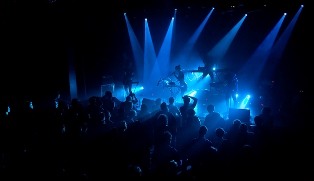 Of course, the remit to give a platform to the up and coming brings no guarantee that fully formed wonders are around every corner. Signed to the hip Tambourhinoceros imprint, 4 Guys From the Future deal in a slightly difficult marriage of Swervedriver rockism and the mood of Big Star’s Third. Topping this with vocals echoing early Primal Scream Bobby Gillespie makes for a disorienting experience. Time will help it coalesce. More immediately gratifying were Helsinki Poetry. Recordings so far have been enviably My Bloody Valentine-ish, but live they ditched the wall of noise to become the shoegazing Tears For Fears. Jolly nice. The most hotly touted newbies were Just a Number 05272011, playing their debut live show (pictured left, photo by Allan Henriksen). Recordings so far are this close to Fever Ray: clearly – after the recent Planningtorock album - a current theme. But live (like Helsinki Poetry), these studio elements gradually disappeared and halfway through their set a pulsing, electro-rave feel took over, suggesting what the fuss might be about. Let's wait and see.
Of course, the remit to give a platform to the up and coming brings no guarantee that fully formed wonders are around every corner. Signed to the hip Tambourhinoceros imprint, 4 Guys From the Future deal in a slightly difficult marriage of Swervedriver rockism and the mood of Big Star’s Third. Topping this with vocals echoing early Primal Scream Bobby Gillespie makes for a disorienting experience. Time will help it coalesce. More immediately gratifying were Helsinki Poetry. Recordings so far have been enviably My Bloody Valentine-ish, but live they ditched the wall of noise to become the shoegazing Tears For Fears. Jolly nice. The most hotly touted newbies were Just a Number 05272011, playing their debut live show (pictured left, photo by Allan Henriksen). Recordings so far are this close to Fever Ray: clearly – after the recent Planningtorock album - a current theme. But live (like Helsinki Poetry), these studio elements gradually disappeared and halfway through their set a pulsing, electro-rave feel took over, suggesting what the fuss might be about. Let's wait and see.
Those not searching for new thrills were well served too. Fallulah was one aspect of what Denmark is currently bothered about. Lucy Love is another. She’s Denmark’s foremost ambassador of grime. The equally popular Nabiha is a Nordic Duffy-meets-Amy Winehouse. More long-term established acts also appeared. The Blue Van put in an after-hours secret show in the small Musikcafféen, romping through a samey and linear Faces/AC-DC pop rock. Thulebasen surfaced 10 years ago and deal in a chugging anthemia that was rooted in a Pavement angularity, but is now Coldplay-smooth with disconcerting left turns into a Liam Gallagher vocal drawl.
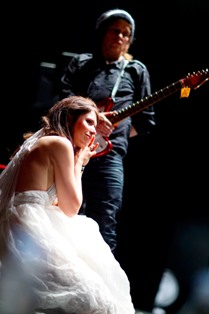 More happily, Treefight For Sunlight's psychedelic harmony pop induced screams during their set in an outdoor tent. Just as satisfying were Kira and the Ghost Riders, a dramatically moody Crime and the City Solution outfit with roots in the early Nineties (pictured right, photo by Michael Ersted). Joined by a six-piece Bulgarian choir and Peter Peter (the guitarist of legendary Danish post-punk band Sort Sol, formerly The Sods), their set betrayed no need to look to recent influences, just an assuredness.
More happily, Treefight For Sunlight's psychedelic harmony pop induced screams during their set in an outdoor tent. Just as satisfying were Kira and the Ghost Riders, a dramatically moody Crime and the City Solution outfit with roots in the early Nineties (pictured right, photo by Michael Ersted). Joined by a six-piece Bulgarian choir and Peter Peter (the guitarist of legendary Danish post-punk band Sort Sol, formerly The Sods), their set betrayed no need to look to recent influences, just an assuredness.
SPOT also had its wild cards. Wildest of all were Japan’s Nisennenmondai, a female three piece that powerfully merge a relentless motorik with a trance/rave approach that’s close to mesmerising. Sweden’s jj are a male-female duo that unfortunately put too many of their eggs in the laptop basket. The tenor-toned singing is nicely moody, but more than that is needed to come across on stage. Visitors from elsewhere in the Nordic world also included Noway's Jenny Hval and Honningnarna (both of whom theartsdesk met in Oslo), Iceland's bonkers choral metallers Ham and a pair of amazing Finnish bands. K-X-P are well known to theartsdesk, and their SPOT set was as compellingly brutal as ever. Siinai were brilliant: almost totally instrumental, with intense Krautish rhythms, ebbing and flowing melodies delivered with an intensity that only Finnish bands can summon.
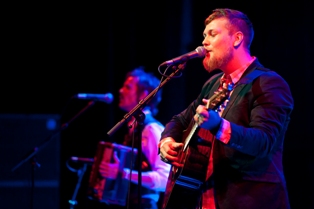 Of course, force is not the only thing that connects. Hymns From Nineveh brought SPOT full circle back to the devotional feel of the Domkirke Our Broken Garden concert. In the Muskihuset’s main concert hall, Jonas Petersen and his band showcased a glorious and unselfconscious music (pictured left, photo by Sebastien Dehesdin). The first port of call is his affecting voice. The audience were behind him. They would be, as his debut album hit seven in the Danish charts.
Of course, force is not the only thing that connects. Hymns From Nineveh brought SPOT full circle back to the devotional feel of the Domkirke Our Broken Garden concert. In the Muskihuset’s main concert hall, Jonas Petersen and his band showcased a glorious and unselfconscious music (pictured left, photo by Sebastien Dehesdin). The first port of call is his affecting voice. The audience were behind him. They would be, as his debut album hit seven in the Danish charts.
The music of Hymns From Nineveh is inspired by Petersen’s faith, but there’s no need to be religious to be sucked in. Lyrics like “I thought your skin was like a veil concealing hope and fairytales” from “Hymn for the Lovers" are universal. This was a special show, Petersen at one with his music.
SPOT left a lasting effect. It also confirmed that Denmark can sparkle. Some artists may not be there yet, but there were shows that shone and surprised. Perfection isn’t guaranteed, but individual moments got pretty damn close.
Watch Hymns From Nineveh performing "So Mournful the Elegy, So Comforting the Hymn"
Share this article
The future of Arts Journalism
You can stop theartsdesk.com closing!
We urgently need financing to survive. Our fundraising drive has thus far raised £49,000 but we need to reach £100,000 or we will be forced to close. Please contribute here: https://gofund.me/c3f6033d
And if you can forward this information to anyone who might assist, we’d be grateful.

Subscribe to theartsdesk.com
Thank you for continuing to read our work on theartsdesk.com. For unlimited access to every article in its entirety, including our archive of more than 15,000 pieces, we're asking for £5 per month or £40 per year. We feel it's a very good deal, and hope you do too.
To take a subscription now simply click here.
And if you're looking for that extra gift for a friend or family member, why not treat them to a theartsdesk.com gift subscription?
more New music
 Soulwax’s 'All Systems Are Lying' lays down some tasty yet gritty electro-pop
Belgian dancefloor veterans return to the fray with a dark, pop-orientated sound
Soulwax’s 'All Systems Are Lying' lays down some tasty yet gritty electro-pop
Belgian dancefloor veterans return to the fray with a dark, pop-orientated sound
 Music Reissues Weekly: Marc and the Mambas - Three Black Nights Of Little Black Bites
When Marc Almond took time out from Soft Cell
Music Reissues Weekly: Marc and the Mambas - Three Black Nights Of Little Black Bites
When Marc Almond took time out from Soft Cell
 Album: Mobb Deep - Infinite
A solid tribute to a legendary history
Album: Mobb Deep - Infinite
A solid tribute to a legendary history
 Album: Boz Scaggs - Detour
Smooth and soulful standards from an old pro
Album: Boz Scaggs - Detour
Smooth and soulful standards from an old pro
 Emily A. Sprague realises a Japanese dream on 'Cloud Time'
A set of live improvisations that drift in and out of real beauty
Emily A. Sprague realises a Japanese dream on 'Cloud Time'
A set of live improvisations that drift in and out of real beauty
 Trio Da Kali, Milton Court review - Mali masters make the ancient new
Three supreme musicians from Bamako in transcendent mood
Trio Da Kali, Milton Court review - Mali masters make the ancient new
Three supreme musicians from Bamako in transcendent mood
 Hollie Cook's 'Shy Girl' isn't heavyweight but has a summery reggae lilt
Tropical-tinted downtempo pop that's likeable if uneventful
Hollie Cook's 'Shy Girl' isn't heavyweight but has a summery reggae lilt
Tropical-tinted downtempo pop that's likeable if uneventful
 Pop Will Eat Itself's 'Delete Everything' is noisy but patchy
Despite unlovely production, the Eighties/Nineties unit retain rowdy ebullience
Pop Will Eat Itself's 'Delete Everything' is noisy but patchy
Despite unlovely production, the Eighties/Nineties unit retain rowdy ebullience
 Music Reissues Weekly: The Earlies - These Were The Earlies
Lancashire and Texas unite to fashion a 2004 landmark of modern psychedelia
Music Reissues Weekly: The Earlies - These Were The Earlies
Lancashire and Texas unite to fashion a 2004 landmark of modern psychedelia
 Odd times and clunking lines in 'The Life of a Showgirl' for Taylor Swift
A record this weird should be more interesting, surely
Odd times and clunking lines in 'The Life of a Showgirl' for Taylor Swift
A record this weird should be more interesting, surely
 Waylon Jennings' 'Songbird' raises this country great from the grave
The first of a trove of posthumous recordings from the 1970s and early 1980s
Waylon Jennings' 'Songbird' raises this country great from the grave
The first of a trove of posthumous recordings from the 1970s and early 1980s

Add comment